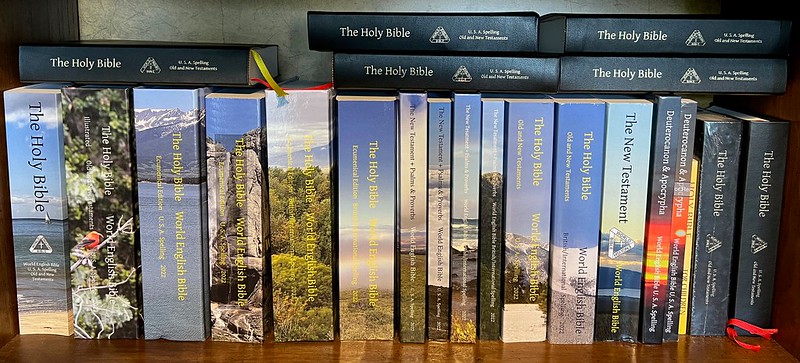
It is easy to argue that there are too many English Bible translations, already. It is nice to have multiple translations to compare, to hopefully understand a passage of the Bible better. But having too many Bible translations in one language could also be confusing or divisive, so we don’t want to add variants without a really good reason for each.
The first variant, of course, was the classic World English Bible. It is a language update of the American Standard Version of 1901. It uses American English spelling. The American Standard Version translates יְהֹוָה as “Jehovah”, but the World English Bible updated that to the more likely transliteration of “Yahweh”. Some other updates were made to conform the World English Bible New Testament to the Greek Majority Text New Testament in places where it mattered the most. That was the first and original variant.
While we were working on the World English Bible, a Messianic Jew approached us about creating an edition that was more likely to be read and used by English-speaking Messianic Jews. It substituted Hebrew names for the more Greek variants that the main World English Bible used. For example, “Jesus Christ” became “Yeshua the Messiah”. Because of strong tradition in this community to not pronounce God’s Proper Name, we substituted “LORD” or “GOD” (all caps) for “Yahweh”. (This required adding “The” or “the” before “LORD” sometimes, depending on context.) This was first called the “Hebrew Names Version”, then the “World English Bible: Messianic Edition”. Now it is called the “World Messianic Bible“. That made 2 variants.
The World English Bible update guidelines had us avoiding any words or expressions that are unique to just one English dialect or location from the beginning of the project, but we planned from the start to create a British edition that used spelling more common in English-speaking countries other than the United States of America. Most of those are subtle, like “neighbour” instead of “neighbor”. As we were starting to implement that, we found that there was a very strong preference in some English-speaking countries to use the KJV-like tradition of rendering ְהֹוָה as LORD or GOD (all caps or small caps), so we did the same substitution for “Yahweh” that we did for the World Messianic Bible as well as doing substitutions for words spelled differently in British English. Thus, the World English Bible British Edition (WEBBE) made 3 variants.
It wasn’t long after we rolled out the World English Bible British Edition rolled out that some Messianic Jews in England requested that a British variant of the Hebrew Names Version be rolled out, so the World Messianic Bible British Edition was made by using the same substitution list used for the World Messianic Bible then the list used for the World English Bible British Edition. Thus, the World Messianic Bible British Edition (WMBB) made the fourth variant.
We cruised along with just 4 variants until the Deuterocanon/Apocrypha books were added to the World English Bible (but not to the World Messianic Bible). Somewhat predictably, people’s reactions to these books ranged from enthusiastic approval to vigorous disapproval, with some in the middle who don’t care or don’t know what they think. While we had the full ecumenical book sets for the World English Bible and World English BIble British Edition, we created “Protestant” subsets for both American and British spelling that only contained the 66 books of the Old and New Testaments. We also created a subset of the World English Bible that contained the traditional Catholic canon + deuterocanon in traditional Catholic order. That made the 5th, 6th, and 7th variant, if you want to count subsets separately.
We learned that some Roman Catholic issued a document stating that “LORD” was preferable to “Yahweh” in Bible readings and liturgy in the church, so we switched the Catholic subset over to using the same rendering of the Divine Name as the British Edition did. We now had “LORD” instead of “Yahweh” in an American dialect as well as British.
Eventually, we got so much feedback from people and denominations preferring “LORD” over “Yahweh” in an American English translation, that we released the World English Bible Updated (WEBu). It is just the same as the classic World English Bible, except for the rendering of God’s Proper Name. In a sort of attempt to unify the World English Bible, we actually created yet another variant (#8). We also switched the “Protestant” subset over to be a subset of the WEBu.
Now we have 3 ecumenical variants with 3 subsets, plus 2 Messianic variants. That feels like too many, but each one has a target audience:
- WEB (classic), AKA WEBUS, for anyone who prefers the use of “Yahweh” for הֹוָה. Uses American English spelling, but it is still readable by people who speak another dialect of English.
- WEBBE for English speakers where British spelling is used.
- WEBu for Americans who prefer the tradition of using “LORD” for הֹוָה.
- WEBP for Americans who don’t want Deuterocanon/Apocrypha books included.
- WEBPB for other English speakers who don’t want Deuterocanon/Apocrypha books included.
- WEBC for people who want the traditional Catholic book set in the traditional Catholic order.
- WMB for American Messianic Jews.
- WMBB for English-speaking Messianic Jews outside of the United States of America.
Although active editing of the World English Bible is finished, typo corrections may still be made. When they are (which is rare, now), all of the above are updated in sync.